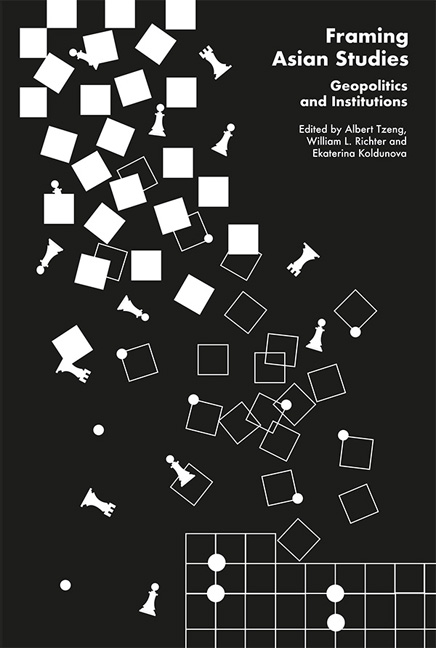Book contents
- Frontmatter
- Contents
- Foreword
- The Contributors
- 1 Introduction: Framing Asian Studies
- I Contested “Asia”
- II Geopolitical Framing of Western Discourse
- III Asian Studies in Former Soviet States
- 8 Southeast Asian Studies in Russia: Agents against Structural Limits
- 9 India Studies in Soviet Lithuania: Approaching Asia from Outside the Establishment
- IV Inter-Asian Gazes
- Index
9 - India Studies in Soviet Lithuania: Approaching Asia from Outside the Establishment
from III - Asian Studies in Former Soviet States
Published online by Cambridge University Press: 28 June 2018
- Frontmatter
- Contents
- Foreword
- The Contributors
- 1 Introduction: Framing Asian Studies
- I Contested “Asia”
- II Geopolitical Framing of Western Discourse
- III Asian Studies in Former Soviet States
- 8 Southeast Asian Studies in Russia: Agents against Structural Limits
- 9 India Studies in Soviet Lithuania: Approaching Asia from Outside the Establishment
- IV Inter-Asian Gazes
- Index
Summary
Asian Studies as a constituent of area studies has constantly been framed by the discourse of a nation-state both as an object of study and as the subject generating demand for such knowledge. In particular, it holds true to nation-state debate in area studies which questions methodology, as well as the organizational principles of area studies based on the concept of the nation-state. However, the predominantly outward orientation of Western Asian Studies, preoccupied with postcolonial discourse, has given less attention to frameworks and strategies of engagement with Asia from the perspective of non-colonial nations in Europe or of those deprived of statehood and sovereignty through occupation, as was the case with the Baltic states in 1940. What is specific about engagement with Asia in these stateless countries is that, instead of producing knowledge in the service of the state, the local academies and in particular the cultural activists set out to appropriate orientalist knowledge for the construction of national identity aimed at resisting the colonial regime.
Lithuania is a clear example of a European nation which, since the late eighteenth century, more than once experienced the loss and regaining of statehood. The epoch of more than six centuries of early statehood, which began in the early thirteenth century, ended with the Third Partition of the Polish-Lithuanian Commonwealth (also known as the Commonwealth of Two Nations) by Russia, Prussia and Austria in 1795. Established in 1569, the commonwealth was a confederal state where Lithuania and Poland maintained their statehood. The collapse of Lithuania's political life was the result of its losing its status as an active state in the region — a position it had held since the early eighteenth century. The Third Partition marked the beginning of a stateless period under Russian rule which lasted for over a hundred years. After the abolition of the Russian monarchy and the subsequent Bolshevik Revolution, the Lithuanian Council, or Taryba, proclaimed the declaration of independence on 16 February 1918. The period of interwar independence lasted until the de facto Soviet annexation of Lithuania in 1940, although the loss of political status as a state had already been determined on the eve of WWII when the USSR and Germany signed a non-aggression pact, known as the Molotov–Ribbentrop Pact, on 23 August 1939. The pact included secret protocols whereby Moscow and Berlin divided their spheres of interest within the region.
- Type
- Chapter
- Information
- Framing Asian StudiesGeopolitics and Institutions, pp. 189 - 208Publisher: ISEAS–Yusof Ishak InstitutePrint publication year: 2018



